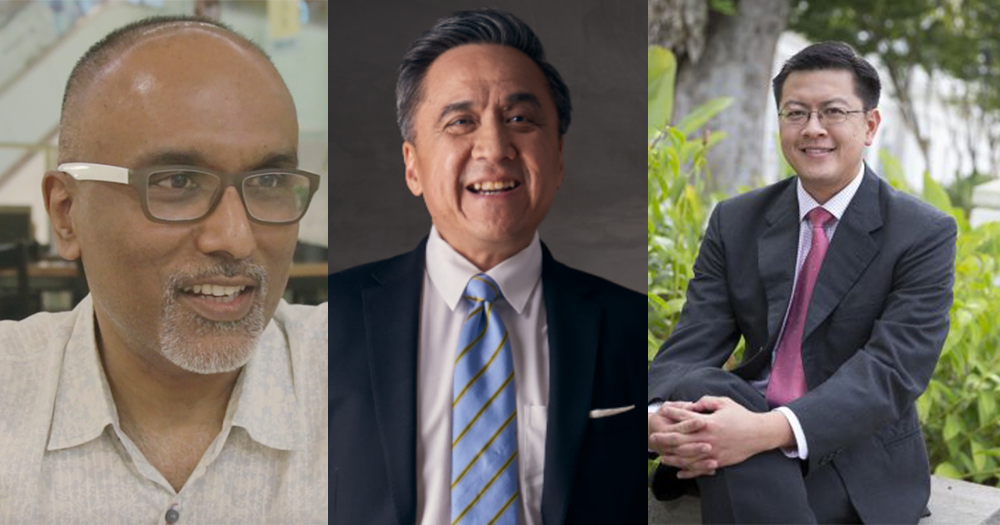Follow us on Telegram for the latest updates: https://t.me/mothershipsg
The death penalty issue in Singapore has elicited a flurry of responses, after billionaire Richard Branson's blogposts resulted in a challenge from Law and Home Affairs Minister K Shanmugam to a public debate, which was turned down.
This led to a number of notable Singaporean commentators weighing in, including Law Society president Adrian Tan, who derided Branson's backing out, and academic Cherian George, who said critics should go ahead with a public debate on the death penalty regardless of whether Branson is involved.
Recent state of death penalty debate
The death penalty in Singapore has been a contentious subject for some time.
This year, a number of high-profile executions involving drug traffickers received international attention.
Before this March, there had been no executions in the country since 2019.
Activist invited to live TV debate
Both local and international figures have spoken out against Singapore's harsh stance on drug trafficking.
One such individual is British billionaire Richard Branson.
In a series of blog posts, he condemned Singapore's use of the death penalty as punishment for drug trafficking, calling it a "disproportionate, brutal response".
In response, the Ministry of Home Affairs (MHA) invited Branson to a live televised debate on the topic with Shanmugam, which the business magnate publicly rejected on Oct. 31.
"[A TV debate] reduces nuanced discourse to soundbites, turns serious debate into spectacle," he explained. "I can’t imagine that is what you are looking for."
Shanmugam had previously debated the topic in a BBC HardTalk interview with journalist Stephen Sackur, an interview format that pulls little punches.
During the wide-ranging interview, Shanmugam explained that there was clear evidence that the death penalty is a serious deterrent for would-be drug traffickers, and it protects Singaporeans and has saved lives in Singapore
Legal commenters weighed in
This evoked more responses from legal commenters here.
On Nov. 2, Law Society president Adrian Tan slammed Branson for his rejection, calling his reasons "feeble".
Referring to the Opium Wars, in which the British waged war on China for their harsh laws against opium trafficking, he wrote in a Linkedin post that Branson's views were ill-informed and "smacks of elitism".
"Let's be clear: when we discuss a Singaporean law, we must consider the views of Singaporeans," he wrote.
No need for justification to outsiders: Eugene Tan
SMU law professor Eugene Tan concurred, noting in a commentary in Today that "Singapore's approach is only for Singapore".
He added that the government's position "must prevail in the court of domestic public opinion", which has shown strong support for Singapore's tough stance on drugs.
In October, a study commissioned by the MHA showed that nearly three-quarters of Singaporeans support the death penalty for the most serious crimes.
Over half were in favour of retaining the death penalty in Singapore, while 22.9 per cent said they do not approve of the death penalty in all instances.
Tan added that maintaining a drug-free culture in Singapore has been a "persistent challenge", particularly amid increasingly relaxed laws regarding drugs worldwide, including Singapore's neighbours in Southeast Asia.
He added that even in the midst of ongoing local debate, Singapore "does not need to justify its anti-drugs regime to outsiders who have no stake in whether our approach works or not".
"Ultimately, Mr Branson is never concerned about Singapore’s progress in keeping her people safe and secure," he concluded.
The debate should go ahead without Branson: Cherian George
But after pushing back against foreign influence, Branson's critics should now redirect their efforts towards spurring discussion within the local sphere, said media studies professor Cherian George.
George said that if Branson's critics view the government's offer of a debate as a sincere attempt to allow Singaporeans to hear all arguments around the death penalty, and if Branson has "disqualified" himself and Singaporeans should be more reliant, then the debate should still go ahead.
"Unless focusing on Branson is meant as a distraction in the service of the status quo, we should hope that these critics follow up in a manner consistent with their stated beliefs," George wrote in a Facebook post on Nov. 3.
"They should use their own influence to organise public discussions hosted by universities or other organisations that they are affiliated with," he added.
George said that Branson's critics should push for "open and fearless discussion" of this policy issue via platforms "at least as prominent" as whatever the government had in mind for the proposed public debate with Branson.
Call for freer discourse
"National TV should show live debates, and government-funded newspapers should open up pages to advocates of different positions," George said.
George added that critics should also call for freer discourse within the nation.
"University students, for example, should not have to worry that their volunteer work will cause them to fail security vetting for public sector jobs and teaching positions," he wrote. "Academics should be allowed to weigh in without fearing for their jobs."
Top image by Ilene Foo and via TSMP and SMU website
If you like what you read, follow us on Facebook, Instagram, Twitter and Telegram to get the latest updates.
